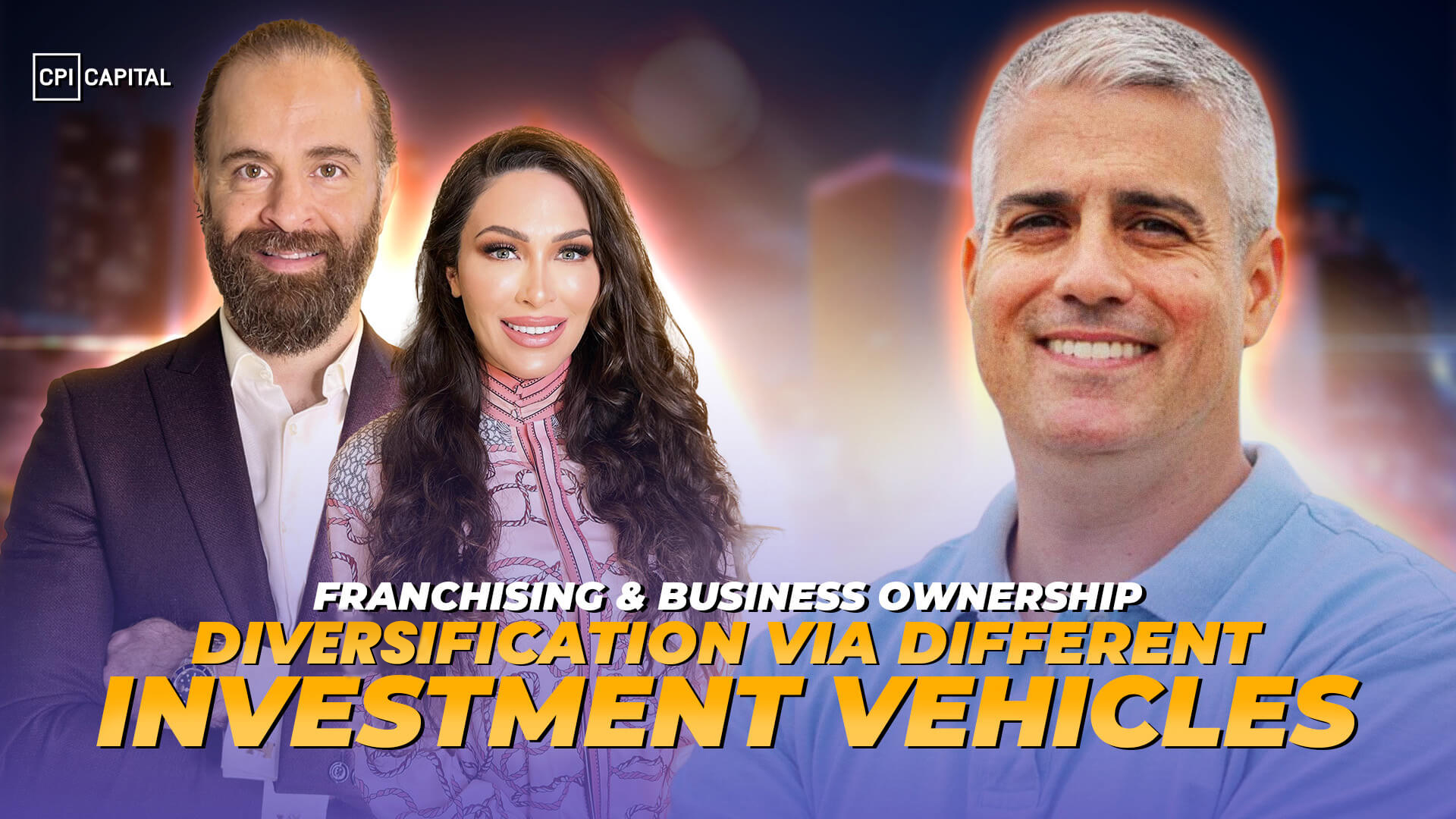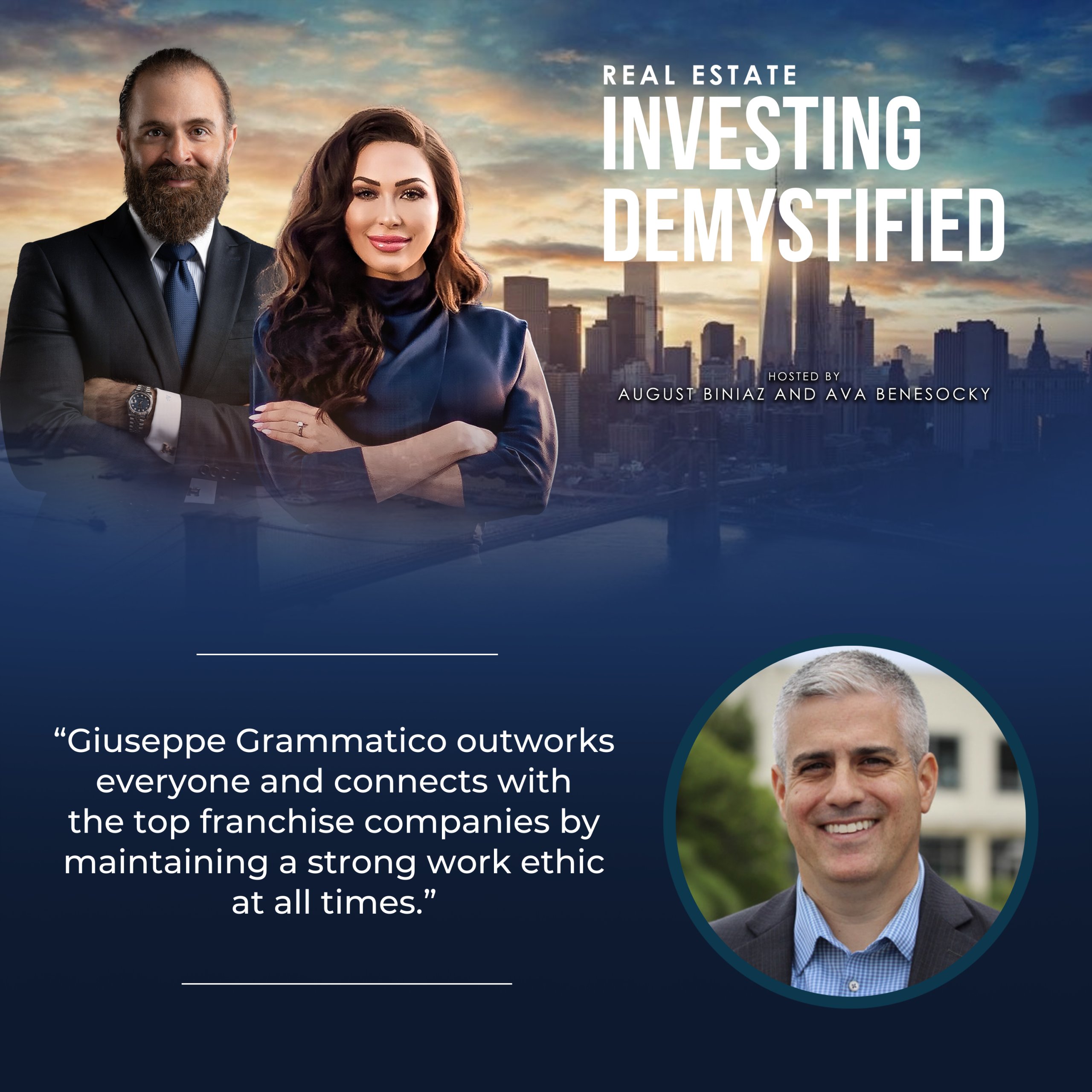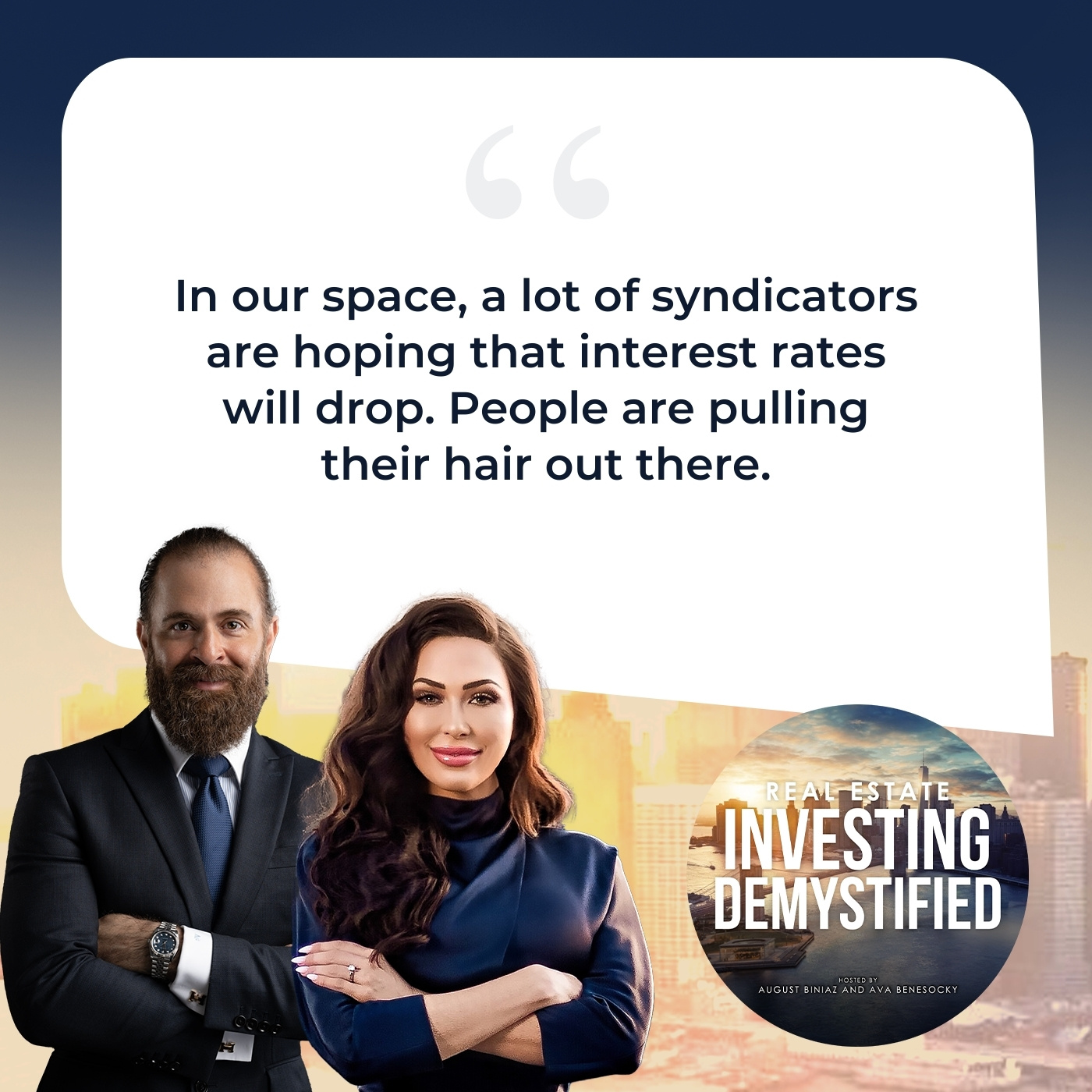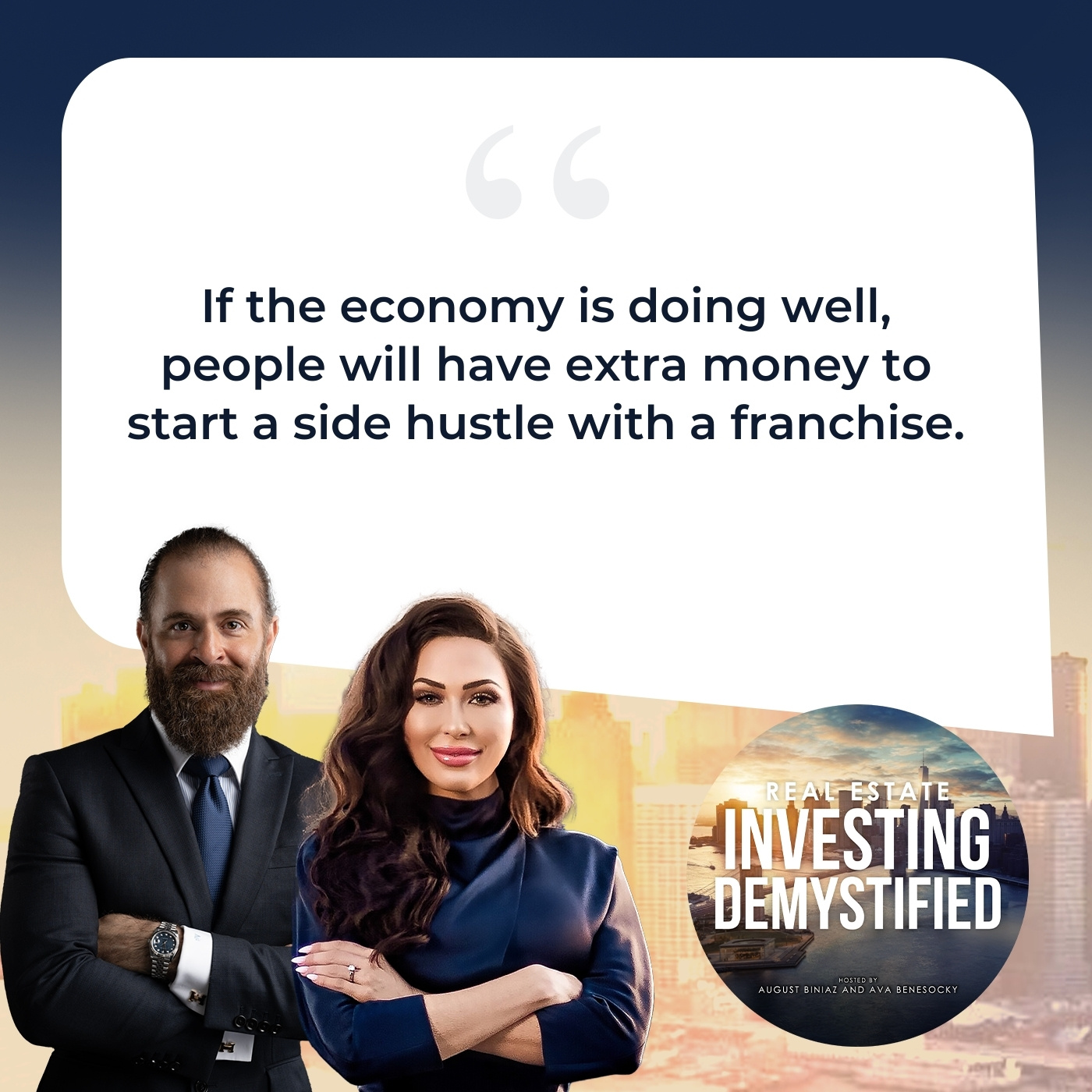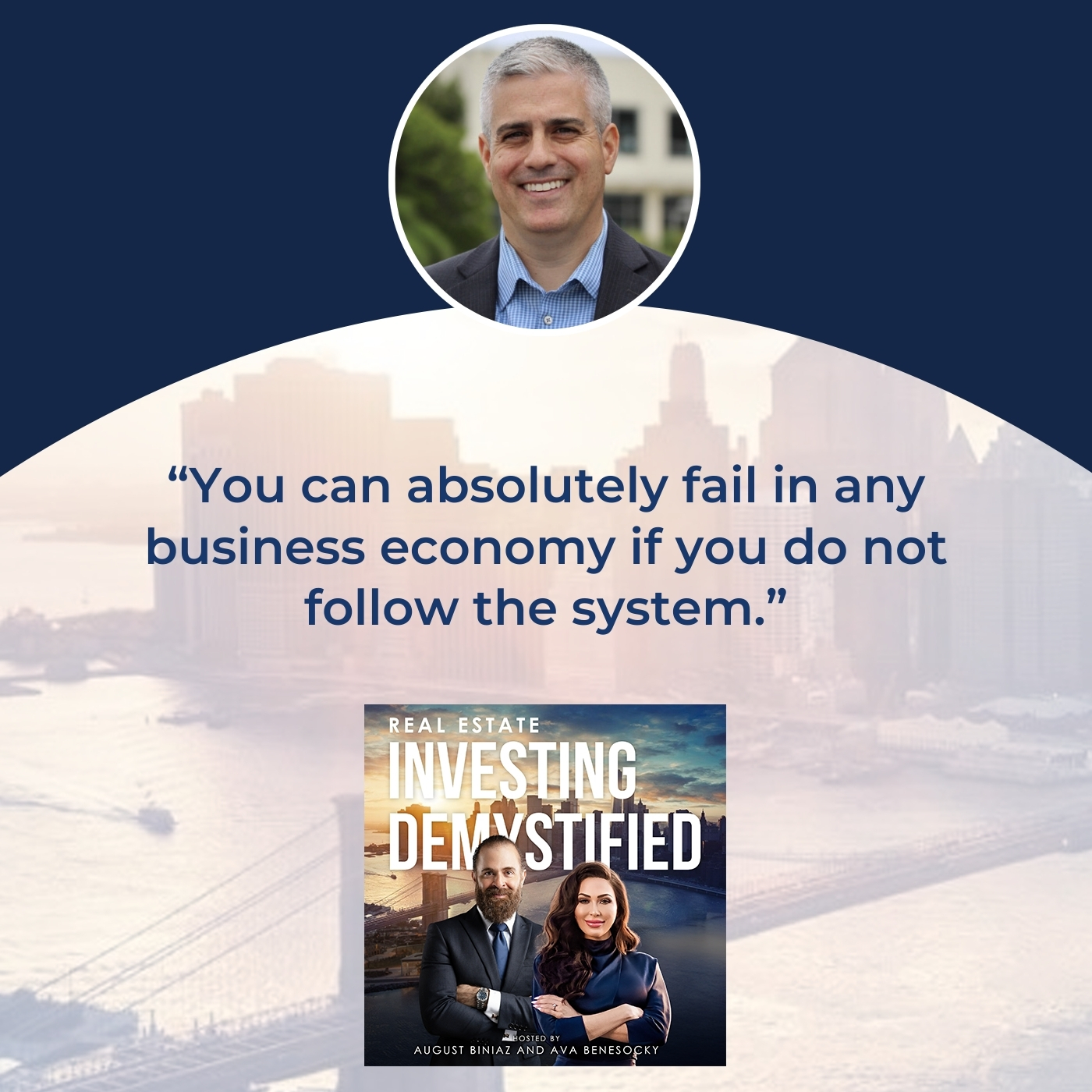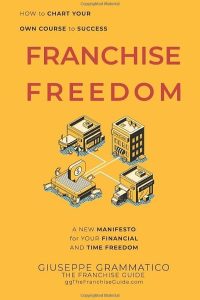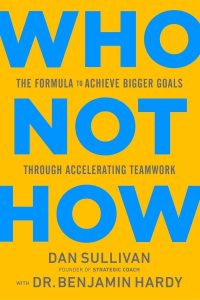Franchising is one of the greatest ways to start a side hustle and diversify your portfolio. Learn how you can get a piece of this action with franchise expert Giuseppe Grammatico. He explains the fundamentals of entering the franchising business, including the typical agreement structures, fees to be paid, and different financing options. Giuseppe also breaks down how he gets compensated in this space through referrals, as well as how this leads to time and financial freedom if done the right way.
Get in touch with Giuseppe Grammatico:
LinkedIn: https://www.linkedin.com/in/giuseppe-grammatico
Website: https://ggthefranchiseguide.com
If you are interested in learning more about passively investing in multifamily & Build-to-Rent properties, click here to schedule a call with the CPI Capital Team or contact us at info@cpicapital.ca. If you like to Co-Syndicate and close on larger deal as a General Partner, click here. You can read more about CPI Capital at https://www.cpicapital.ca.
#avabenesocky #augustbiniaz #cpicapital
—
Watch the episode here
Listen to the podcast here
Important Links
- Giuseppe Grammatico
- Giuseppe Grammatico on LinkedIn
- Giuseppe Grammatico on Facebook
- Franchise Freedom: A New Manifesto For Your Financial And Time Freedom
- The E-Myth Revisited
- Who Not How
About Giuseppe Grammatico
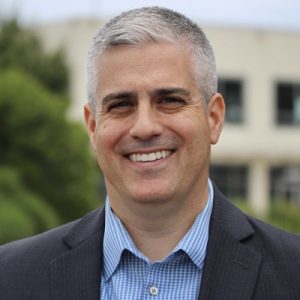
Franchising And Business Ownership Diversification Via Different Investment Vehicles – Giuseppe Grammatico
Welcome back to Real Estate Investing Demystified. Another day, another dollar.
You’re giving up the secrets again. It’s right after the Fed made the decision to hold the rates. That’s such an important factor in the world of finance business, real estate in particular where the interest rates are at. When the Fed increases the rates or drops their rates or keeps them steady, it affects the real estate market.
It riffs the economy as a whole, but it’s interesting to see the arguments going back and forth between the Fed Chair, Jerome Powell and President Trump. I’m a business guy and a real estate guy. Trump is a business person. He is a realistic person, so there’s a lot of alignments there. When you have the President of the US literally arguing with the Feds chair and trying to fire the guy and talking about REITs like it’s emotional.
Also saying he’s doing a bad job.
That’s why. He did a bad job because he didn’t increase rates sooner with a whole COVID fiasco but I’m talking about now. They don’t change rates due to somebody’s feelings or emotion or how they feel that day. They do it for its strong economic backing and what’s happening. There’s so much data. There’s so many people that are much smarter than most people in the world are over there coming and saying, “Drop the race.” If the inflation goes up in a couple years, we’ll just increase it.” He’s trying to just maybe get a good economy while he is in power. I didn’t like that part.
It’s simple. He believes that to drop the rates people will be able to start.
It’s not a bleep. That’s an actual fact.
People will start buying properties.
Buying homes.
I know in our space, a lot of syndicators are hoping that those rates are going to drop. People are pulling their hair out there.
A lot of high octane. There was an article that came out in Harvard. They write articles and there was an article that came out and talks about trillion dollars in CRE loans that are going to mature over the next twelve months that are in a bad place now. As we’re talking about a healthy economy, let’s continue that conversation because it somehow connects with our guest, healthy economy and healthy portfolio.
Diversified portfolio as a healthy portfolio and we always add that to our investors. We say, “Don’t put all your eggs in one basket.” Our guest is focused on a very interesting investment process, investment vehicle. It’s a franchise. Ava, it’s something that you and I have, over the years, looked at possibly being involved in and purchasing a franchise.
Years ago, we were looking into purchasing possibly some pharmacies but we never ended up going through with it.
A lot of celebrities are involved in franchisees as well. Rick Ross being involved in Wingstop. He has a big owner. Let’s do an introduction of our guest and we can get the show going.
I can’t wait to dive into things. Everyone, we are joined by Giuseppe Grammatico. He is a Franchise Veteran Coach, Author, Speaker and Consultant who simplifies the process of franchising and excels at guiding his candidates the business model that best suits their desired lifestyle. His greatest joy is helping people realize the American dream and sharing the freedom that comes from franchising. Welcome to the show, Giuseppe.
Welcome.
Thanks, guys. I appreciate it. I like that beginning, economics. I just love following all that. It’s so many so many inner workings in how all that works and a nice fine balance. I enjoyed that.
I bet it affects your business as well. If the economy is doing well, people have extra money that might want to just start a side hustle with a franchise. It definitely connects there.
How Giuseppe Got Into Franchising
Giuseppe, let’s start off with your story. How did you first get into the franchising business?
I’m first generation. My family came over from Italy. I learned English at the age of six and I grew up, ironically, in an Italian restaurant. That’s where I grew up. At a very young age, I’m bussing tables. I love business ownership and didn’t like the hours, the holidays and weekends of a restaurant. I was the first person in my family to go to college, did my undergrad and graduate degree from Rider University in New Jersey and realized Corporate America wasn’t in my thing.
I did well. The money was good. I worked on Wall Street for companies like JP Morgan and didn’t like the 50 managers above me. I didn’t like politics and just everything that went along with it. I felt like I was a number. I looked at other jobs and the same exact results so I decided I wanted to own a business but it wasn’t an actual restaurant. I found a franchise consultant, which is what I do now. They were guiding me through the process and learned that franchising wasn’t just about fast food. They were franchisees in about every industry. Four thousand franchise companies alone in the US and Canada combined.
Which was something I had no idea about. I did this all because I knew that growing up, we never saw dad and dad was always working. I said, “I want to create something where mom and dad can be home for the kids.” That’s what I created. I created a life where I was able to work from home and have flexibility. I became a coach and never missed a soccer game since my son was four years old. That’s why I got into franchising.
The Ideal Client In Franchising
That is awesome. He did say he learned that franchising was more than just the restaurant business and that was something I asked August before the show. There’s like 4,000 different things. It’s very good to know. Giuseppe, who would you say your ideal client is? Aside from those who are already involved in franchising, what person is typically interested in becoming a franchisee?
It’s someone that is not happy with their current situation. On my website. we say corporate executives and all that means is that you had a few years. You got a taste of Corporate America. Hopefully, save the feud dollars and have some money to invest in a business. It’s someone that, number one, has money to invest that is able and willing to follow a system and is looking for some type of change.
Franchising is for people who wants to gain an additional income stream or transition from employee to employer. Share on XWhether it be an additional income stream or a complete change from employee to employer. We work with that. Those are our bread and butter where we get a lot of calls. I also work with existing business owners looking to extend their portfolio. Maybe they’re in a certain industry and they want to branch out into others, for example, home services. We work with existing business owners as well.
I heard you talk about one of the show times, freedom and that stuff, and lifestyle change. Would you say that like in our business, a lot of investors invest with us because they want to have that passive income or cashflow so they can free up more time. That’s probably not their main objective. Are they looking for more time freedom or are they looking to change a business, get their hands dirty and start something new from the ground up?
The reality is, regardless of the vehicle, if it’s a franchise or real estate, they’re looking for the exact same thing. The reality is, it comes at different times. That’s going to be the biggest thing. We have franchisees or potential franchisees that say, “We will do whatever it takes. We will work 120 hours a week to get the business up and running because I want time freedom.” I understand that there is no time freedom and there’s definitely no financial freedom when you first start a franchise just like many other businesses.
With that being said, the goal is to get that first year under the belt, make some money, build a team or get the team together, the ideal team and eventually experience that time freedom. People are looking for different things. It used to be all about finances. Now, people are like, “I want maybe a business that gives back a little bit or I’m noticing money is great, but if I don’t have time to spend it, it’s useless.” People are switching, I’d say ever since COVID. They’re saying, “I would prefer time over financial freedom if I had to pick one over the other.” We noticed a shift with a lot of people we were talking with.
It’s such a great answer that Giuseppe gave us. It’s also like, is the timing factor as well. You want to get time freedom but that first few years is front-loaded work that goes into a franchise. In my opinion, the franchise expedited the process because if you’re looking to just start a startup like me and you did, if you were starting CPI. There’s so much that goes into not following a template.
Whereas with a franchise, you’re following the template and it expedites the process. The first couple of years is probably going to be hard but that process of getting into that more passive way of having an income or spending less time at the business itself is much more possible. A quick question on that. Franchises do require the principle to stay certain hours, don’t they?
Some do. Some will require you to be full-time as their franchise avatar. Others will allow you to be semi-absentee on day one. Some will have you running it part-time but you have to be in the state. Others are pretty open. It’s not by industry. It’s by franchise.
We’re getting into the mechanics of it in a moment.
How Franchises Are Typically Structured
Giuseppe, can you walk us through how franchises are typically structured? What does the agreement between the franchisor and the franchisee look like?
What is a franchise? A franchise is a proven system and the franchisee is buying into that system by paying a franchise fee. Those fees could be anywhere from on a single territory location. We’ll say $10,000 to $100,000 with the averages being right around $50,000 or $60,000. You have access to the entire system. Usually, the length of time is on average ten years, which can be renewed and you work with that franchisor in that system.
It may be a McDonald’s or a mosquito spraying franchise, where you’re giving a set territory. You work with that franchisor to get up and running. In many cases, a non-retail, non-brick-and-mortar type of business, you could be up and running in 90 days or less. It could be one month or two months. It can go up to three, depending on if any equipment or vehicles are needed but essentially, they’re giving you the blueprint, the guide to execute on. It’s not a set and forget it. It’s not passive income. I don’t like that word in franchising initially unless you’re Shaquille O’Neal and some of these others that have these huge teams in place and have access to that capital.
If you’re following that system, that blueprint, you’re offering the services and expanding either by purchasing other locations, other territories or even other franchisees and you’re executing on that franchise. When you talked before about looking at franchises and a startup, a major advantage with the franchise is you’re up and running quicker. It’s the time value of money.
It’s a $50,000 franchise fee but you’re up and running in 90 days, versus maybe taking a few years and a lot more trial and error to get the business up and running. Both works. People do well in franchise and non-franchise. It depends on what you’re looking for and what type of autonomy and flexibility you’re looking for.
You brought McDonald’s and a fee to get started. I was going to ask you, can you break down the royalty structure for us? For example, McDonald’s probably owns the real estate, I’m assuming. At least it’s to the franchisee. How much does franchisee typically pay to the parent company?
McDonald’s is unique in that they own the real estate but typically, I would say, the average franchise. You pay between roughly 5% and 10% of gross revenue. It’s how they’re structured. Some brands have minimum royalties or flat royalties. You pay the same amount every month. Other brands have sliding scales where maybe you started 8% and as you progress and start doing it. For every million, it drops a percentage. It depends on the brand but it’s typically on gross revenue. Not on profits. The franchise fee is only paid once. You don’t pay that again. It is just on a per territory location.
It’s an upfront fee.
Available Yield In Franchise Ownership
Now that we’re talking about economics, let’s talk about the type of yields that are available in franchises in the real estate space, commercial real estate space. We’re looking at the metric that we follow as cap rate. It’s somewhat similar to the cash on cash, ROI somewhat as well. What type of yields are there in franchise ownership? Is there both cash flow and equity growth like the cost of the franchise as it goes up over the years as you manage it and operate it?
There’s a couple things. A franchise is your own business. You own it 100%. I had someone on the show saying, “You don’t own the franchise.” I go, “You own your specific location. You don’t own a piece of the actual. You don’t own McDonald’s Corporate. It’s your own LLC or S-Corp or whatever your entity is.” Number one, you’re going to gain value just like in any business, depending on the size and on the number of locations. In history, 3X or 4X or 5X seller discretionary earnings is very typical.
A franchise is your own business. You own it 100%. Share on XThe ranges that have been higher have been less. It all depends on the situation. One thing I always say is when you’re looking to sell your franchise contact, the franchisor and they can give you an idea like, “I know that window covering businesses usually sell for 3X. Historically, our brand has sold for three and a half times. That’s the number you should stick to because we have that data and we’ve had multiple sales. You can hopefully get closer to that number.”
When it comes to earnings and things like that in cash-on-cash return. Most franchisees are going to be funding this via the three top options I see on funding like SBA loans and government back loans. You’re putting maybe between 10% and 30% down, depending on what they’re looking for. Plus, what the franchisor is requesting. Retirement rollovers, where you just put in 100% of your retirement followed by home equity loans.
Those are the three most popular ways to fund a franchise and there’s a dozen other options depending on where you’re located. In Canada, you want to have access to the SBA but you have the home equity amongst other options. Finally, as far as earnings go, at the end of the day, when you speak with the franchisees because the franchisor is going to be giving you an Item 19, which is a financial representation. It may list every P&L of every franchisee. It may be just top quartile or bottom quartile. You’re looking for margins, but you’re looking for what’s missing and where people missed the mark is AUVs or average unit volume.
If you’re in the cleaning business, you may have lower margins of 10% or 15%. I had someone say to me, “Why would I look at something at 10% or 15% when another brand is showing me double those amounts?” I said, “Those amounts, you have to also look at the average unit volume. What is that business doing?” If you’re doing 15% margins, which is half of the other brand but you’re doing ten times the amount of volume. At the end of that, you’re like, “What could each territory or location yield me?”
The margins are going to be different. It’s going to depend if you’re running it full time or part-time. We’ve seen people in their first year breaking even and maybe not making money to be extremely profitable. It depends on the model, how lean that model is. For example, a 1099 model. Your cashflowing a lot quicker. There’s less startup. You’re paying your contractors after you’ve been paid and after the job has been completed. You’re paying them after the fact, so you have a lot less labor. You may only have one salesperson and one ops per person.
Those margins tend to be greater and cashflowing a lot faster because the contractors are putting their equity and money at stake to get their employees in place, equipment, trucks and things like that. There’s so many different options but ultimately, the question asked is, what are you making per territory or per location? You’re factoring it. What is that percentage? How many locations are territories I need in order to get to whatever number is my goal?
In commercial real estate, we look at it a bit differently. We look at it as, how much yield would we get if we bought this property cash? We get our net operating income. Let’s just say on the back of napkin underwriting. Half of our income goes to management and other costs and the other half is the yield that we’re getting on the total price that we purchased the property at. If it was purchased cash and all your upfront cost for the first year, what would the annual yield be on that total amount? Do you guys ever calculate in that way?
We do not. There are franchisees, none that I’ve worked with that buy the properties that they’re going to be in and I’m sure that applies there, but we’ve never calculated in that way.
The way that the loan is structured plays a big important factor here of where that money is coming from to purchase it and fund the franchise.
With the SBA, you’re looking at whatever percentage it is. Also, if it’s a resale, if it’s a new franchise or not. That affects the percentages but you need to make sure you have the credit scores and everything. I always say, if you have the capital, someone said, “Why don’t I just put my cash at stake?” I go, “That’s fine.” I like to leverage the loan’s interest rates. I know historically, they’re still pretty low when you look at the big picture. I’m not too concerned about interest rates.
You can pay off the loans sooner but ultimately, I like to put as little of my capital up front as possible and look at expanding. Look at that cash-on-cash return and expand into another location or another territory or another brand, which is what a lot of people do. They brand stack and they add. For example, they have a cleaning franchise and then they stack on a painting franchise then a roofing franchise so they can truly own the home in their markets.
How Much Cash You Should Prepare For Franchising
We’ll get into that. On the finance topic. If somebody wants to buy a franchise. Let’s say a franchise caused a million dollars. That million dollars would be funded through a certain type of loan or whatever the loan that’s most advantageous. How much cash should they have on hand relative to the price of the franchise? If the franchise cost a million dollars, do they need to have a quarter million cash on hand, that liquidity amount to pay for rent and other costs? How much cash are they coming into the project with?
The number one thing is they want that 20%. With 20%, we’ll look at $200,000 down on other aspects and this will vary. The brand itself is going to look at liquidity and net worth requirements. Even though you can get a proof of the SBA loan, you still have to meet the requirement from the franchisor. That may be a quarter million in cash and $500,000 in net worth. You have to meet the franchisor requirements and what the SBAs are looking for. It helps to have a job. That’s a big plus there, or at least one person in the family.
Maybe the spouse is working or one of the partners is working. If they have that job and they have that high credit score, you say, “We can maybe approve a larger project cost. These are the terms.” Potentially, bolting on a line of credit, which we’ve seen the SBA do as well. They’re going to be multiple requirements but having employment, whether it’s a couple one person employed, 680 plus credit score, that 20% down, plus meeting the requirements. I’d just say about $2,250 cash and about 500 net worth. It’s a great starting point on a million-dollar investment. Again, it also depends on what that investment is.
$200,000 for the down payment. The $2,250, is it just to show or that’s going to be used for the business?
That $250 in liquidity, you’re going to apply 200. Assuming you hit exactly the $250, you would use $200 of that to put down and that would be the downpayment, which goes directly to the franchisor to cover the franchise fees for that specific business.
You’re saying that you don’t need any more cash to run the business. Does that money comes from the business itself?
You’re going to be using that, then you’re going to get the proceeds from the loan. You’re going to get another $800,000. You’re going to cover franchise fees and other startup costs. What happens is, the franchisor will give you an estimate of what it will take startup wise from the day you buy the franchise, the actual franchise fee to 90 days of operation. You’re still going to have cash reserves in there. Plus, you’re getting the proceed. You’re putting $200 at stake of your own money or your liquidity. You’re going to be getting an additional $800 from that $800 assuming that the $200 just went to the franchise fee.
It would go towards build out. You’ll have a complete business plan. Part of that is going to be itemized. You’ll have three months marketing, three months’ salary, three months working capital, first and last month rent to the landlord and any build at cost like professional fees. The item seven in the franchisor will list a high range of all the costs involved to start a new franchise. I hope that answered it. Once you see it, you’ll see all the itemized lists.
You’re saying the money you need to run the business is within that $800,000 that you’re borrowing to buy the business. You don’t need any other funds to run the business. Hopefully not.
These are estimates. Ask the franchisees, what were your costs? That’s why you’re going to have a low and a high end. Did you run it with the general manager? That’s going to be a higher cost investment because of that added salary, versus running it full time. Some people go a little bit more aggressive on the marketing. Some people don’t do as much, so they get ranges. You can go line by line and say, “I’m going to be on the higher amount here. I’m going to be on the lower amount. My wife’s a tourney. My husband’s an attorney. We’re going to handle the professional fees in-house and you’re going to go line by line to come up with what that end mount is, whether it’s not $900,000 or $1.1 million.”
The last piece is the landlord, if they’re giving you any TI or any type of credits for improvements and things like that. That will not be reflected in the investment. That’s considered a bonus because that’s going to be case by case. The landlord may give you back $100,000 over the lease of ten years that won’t be in the investment because the franchisor cannot predict what you’re going to be getting in return. They can give you a history of what that number looks like.
It sounds good.
Operating A Franchise Remotely
It makes sense. Let’s change the conversation a little bit to the flexibility of being a franchisee. Is it possible to own and operate a franchise remotely?
Yes. Given some of the advancements in AI and Technology, we have brands. As long as you have the right employees in place that can be run remotely. For example, we have a pool cleaning and installation franchise. The whole business can be run from your phone. Now, your employees are going out and contractors are going out doing installs, but the owner’s role could be done remotely. That’s the case for many other brands.

Franchising: Thanks to advancements in AI and technology, you can run a franchise business remotely as long as you have the right employees.
If there’s a text stack in there and you have the right employees and those employees know that they are the face, they are the ones going to the Chamber of Commerce and things like that. That could be run remotely from the actual business. If you flip it around from a service that’s offered remotely, you have things like cybersecurity, where the franchisee or his or her team will go out and meet with small business owners with 25 employees or more.
Operations may be managed overseas where they’re monitoring the back end and preventing any type of cybersecurity attacks. That’s remote and the service itself is being offered remotely. As long as your phone’s not ringing, that’s a good thing. You don’t have any issues online. That’s a good thing because they’re handling everything from, in most cases, a different country.
Good to know.
Scalability Of Owning Franchises
I remember when I was younger. I was either late teen or in my early twenties. Somebody was talking about somebody else like, “You know who that guy is? His parents owned twenty Tim Horton’s.” The way he talked about him like they were a royal family or something. A light bulb went up in my head that owning that many franchises makes you this super wealthy and super successful person. I wanted to talk about it. We moved to Naples, and there was a fellow in one of the cigar clubs that I’m part of that used to own 40 Taco Bells, I believe.
He had sold them. He was super wealthy and had retired. Talk to us about the scalability of owning franchises. If one franchise person is supposed to be owning a certain franchise, why does it make sense for the franchise company to allow them to keep owning more of these units? Why shouldn’t others own these individually? Give us a breakdown of the scale of ability of these businesses.
In franchising, what I will say is there’s no correlation between your investment and the return. If you own a million-dollar fast food chain or $100,000 painting business, there’s no core relation. For me, it’s the fit. It’s got to be something that you can run and you’re going to be comfortable with. You’re not going to get burnout because you have constant turnover, just say in your staff. Owning 40 Taco Bells is impressive. They’re physical locations are large investments but you don’t need to own that many to make a good living.
There are groups that get together. For example, I’m in New Jersey, two blocks from where the first Jersey Mike’s was started. There are investment groups. In some cases, I know dozens of Jersey Mike’s all over the country looking to essentially diversify their investments. The franchisors themselves make a lot more money selling individuals. If they were five Jersey Mike’s and they sold five franchises. They would make a lot more that way versus selling it to one franchisee that bought five locations. Why would they sell someone more than one location? It’s because they have a track record with you.
They’ll award you five. You’re going to open up one. They’re going to monitor you and make sure you have the financial know-how. You can fund these projects. The more you can open, they can potentially award you more and more. The franchisor makes less up front but they know they have a great operator. They know that you have the funds available and you have access to employees and things like that. That is why franchisees will award you more than one territory or location. It’s easier for them when they have great operators.
If it means having a hundred franchisees versus 200. They’re okay with it as long as the systems are being followed. You’re following the plan, which is usually six months to open up each territory or one year to open up each location. They prefer that route knowing what they have and the track record that franchisee has.
What Makes Or Breaks A Franchise
On that note, if franchisees are cookie cutter businesses, what differentiates one franchisee performance from another? Why does some succeed while there’s pretty much struggle?
A big part of that is the systems and the support. A lot of the systems are similar when you go from, just say, two painting brands. In the systems, it’s that support and follow through. Maybe both brands have you fly out to training, learn exactly how to acquire customers and find your vendors and how to find your first few employees. We have some brands that will come out to your location and close some business together and start to build some momentum. That was my experience, working with the vendors, learning the lingo and figuring out exactly what is right in your area, what is the appropriate amount to pay a subcontractor for using subcontractors.
Taking it to the next level. In some cases, founders will come out and train with you, learn and get feedback from the franchisees and things like that. The other piece is some people that buy franchises aren’t following the system, believe it or not, which is something I find interesting is, though. Invest in a franchise and they’ll get awarded and maybe only use the marketing for the first month and not see the performance they’d like then decide to use a local company or decide to stray from the main product, service offering and go a different direction.

Franchising: Some people who buy franchises are not following the system. They stray from the main product or service after a month and go in a different direction.
I see that on a case-to-case basis. Not often but it does happen. I always tell people, “If you’re not going to follow their system, there’s no point in buying their franchise. That’s their bread and butter.” Now, if you want to add complimentary services, as long as they don’t compete with the franchise. You could do that down the road. If you’re buying a McDonald’s, you’re using their menu. You’re not going in with the intention of changing their whole menu.
You’ve mentioned both Canada and the US. How do franchising strategies or opportunities differ from the two countries?
In Canada, there’s less options. I’ve not done a lot in Canada. We’ve worked with a few E-2 visa candidates looking to move to the States, but I would say they’re definitely less options. I don’t know the reason why.
How To Get Compensated In The Franchising Business
Giuseppe, let’s talk about your role. How do you get compensated in the franchise process? Are you involved with all franchises out there? Do you only sell what’s on your shelf? Talk to us about that place.
We are compensated with a referral fee. If you purchase or invest in a franchise that we refer to you, the franchisor will pay us a referral fee like a real estate agent does. We have two full-time employees in the back office that pre-screens companies. They’re looking at franchises. They’re looking at not just what you did in the past but if you have 50 franchises, can you support another 50? They’ll speak with franchisees, the franchisor and review the franchise agreement and the litigation history if there’s any. Talk about their process and with the founders and decide if it’s a good fit. Do we work with every company? No, but I’d say we work with the top 5% of franchise companies out there.
Why Some Franchises Revert To Privatizing
Another situation that I’m aware of in the franchise world, I’m not sure if you’re familiar with Nando’s Chicken. Is that something that you’ve ever heard of? It’s a South African company grilled chicken. They call it very common. Nando’s Chicken has lots of locations but at some point, a lot of people bought franchises across Vancouver and Western Canada. At some point, Nando’s started buying back the franchises and wanted to go fully private again. Have you ever heard about such a thing? What causes that to happen?
It’s a good question. Does it happen often? I know in some cases if a franchisee is underperforming or unable to sell.
That wasn’t the case. They just decided to come back and buy all the locations back.
Does it happen? I don’t know how often it happens but why would they do that? That’s a whole different strategy. The whole point of franchising is for that expansion. I don’t know what was put in their FDD. I’m not as familiar with that brand. I know the franchisor now is going to have a higher profitability but I don’t know what that agreement looks like, what the buyback was or if there was an agreement in place prior to that. I don’t see that too often as far as buying back all their franchisees.
I’ve seen where they purchased master franchisees and that’s a regional developer that may buy the whole state of New Jersey, for example, where they’re like the middleman. They are the master franchisee and master franchisor. I’ve seen that in the past but I’m not as familiar with buy backs of all their individual units. That’s something new.
Another one is Starbucks. Starbucks is not really a franchise. I went to a local Starbucks that was close to my home here. I walked in and it was around Hanukkah time. There were all these stars of David all over the place and all these candle holders. It was like a very Jewish themed Starbucks. I asked the girl working there. I was like, “Is this happening across all Starbucks?” They’re like, “No. This store is partly owned by Jewish fellow.” I didn’t even know that at that time that you could partly own a Starbucks. I never knew Starbucks was a franchise.
I did not know that either.
That was rather another question.
Can Franchisees Be Syndicated?
Can franchises be syndicated? For instance, if McDonald’s cost $2 million, can that investment be broken up and syndicated like a real estate deal? When we find an asset, we go to our investors and syndicate it. Investors put in whatever amount they wish. Have you seen that happen a lot or is it just one person buying it with their own capital?
It’s typically one person buying it, but then later on like in the case of Jersey Mike’s and a few of these others. You’ll have these investment groups but put in place. The franchisor wants to know who they’re dealing with. You can have multiple people there. They are completely okay with that. They’re going to want some background information.
They’re going to want to know who the owners are and all their contact information. In the case of a default or something goes wrong, they’re going to want to know, did you set up an LLC or S-Corp? They want to know who the owners are or have copies of all that. You see more investment groups. They start raising capital and have multiple owners. Franchisors are okay with it as long as they have the listing of the owner, their home address and all contact information if they need to get a hold of them.
Success Or Failure Rate Of Franchising
Last question before we get to the next segment of the show. Let’s talk about risk. What’s the failure rate of franchises regardless of the industry? Is there a risk that a person who started a business can lose all their capital and go to zero and completely fail?
You can fail in any business economy if you don’t follow the system. One of the biggest things is if you’re undercapitalized. Numbers are easy to put down on paper but if you added an extra zero to make it look a little bit better and don’t have the backing or that six-month living expense that we recommend to everyone. I don’t know if there’s a percentage out there because there’s so many different reasons a business could fail in general.
I will say the odds are in your favor if you find that right match and if you do follow the franchise system but I’m not aware of percentages. I do know that it’s a much higher success rate. That’s all I know. I’ve looked for numbers in the past and I’ve heard numbers with a success rate of 90%. I don’t know where 90% came from because there’s closures and people that have gone out of business.
How about industry? Is there a risk in the industry than others?
There could be but it’s how you go about the business. I love recession resistant, senior care and rest water and smoke mitigation and restoration. Some people feel that food and some of the maybe trends are going to be riskier because they don’t know how long these trends are going to last. I would say some industries when you get into food in certain spaces. I don’t want to single anyone out but I love the unsexy stuff.
I love the unclogging of drains. I love water. If you have water floods, that’s great, all day long. That’s a business that did well during COVID. We had that nice stress test and we’ll do well in any down economy. Those businesses do well in a down economy where people get their nails done and eyelash extensions and things like that. Possibly, but maybe not in all markets. Not just industry but the area that you’re going to be targeting plays a big role as well.
That was a great crash course on franchises. We could talk to you all day long, but we’ll hold it there. Thank you so much for all the information. Let’s get to the second segment of our show.
10 Championship Rounds To Financial Freedom
The ten championship rounds to financial freedom. Are you ready, Giuseppe?
I think so. Let’s do it. I’m ready.
Let’s get into things here. The first question, who’s been the most influential person in your life?
This one’s an easy one. Those are my parents. I didn’t appreciate them then but the first generation, learning at the age of six, seeing how they came from another country and had a successful restaurant. That’s a pretty high bar to meet.
What is the number one book you would recommend?
His own book.
I would love to. Franchise Freedom, which I love. This one’s overused but I’m going to go with it anyway. I talked about E-Myth Revisited by Michael Gerber. He talks about systems, which is exactly what a franchise is and how a technician, for example, a plumber may not be an actual business owner. Not everyone should own a business and you need systems in order to scale and to grow business.
My mom just sent that to me.
That’s the book.
She said, “You should read this book. It’s so amazing.” I’m like, “Okay.”
That’s the Bible. That’s an equal franchise. It’s all about systems and not being a technician in your business.
Next question, if you had the opportunity to travel back in time. What advice would you give your younger self?
Have fun. Enjoy. I was all about having the end in mind, retiring, making money and all that. In some cases, I forgot to enjoy the journey. I would go back and say, “You didn’t have to rush through college to graduate as fast as possible and not give yourself a break in between undergrad and grad.” Enjoy the ride. That’s life. It’s the ride. It’s not necessary just the destination. That’s a big one for me.
Good advice.
August says that all the time. I think you’re just giving somebody that advice. Next question, what’s the best investment you’ve ever made?
That’s a good one. There was a financial advisor prior to getting into franchising and with everything I learned, it goes back to index funds when it comes to actual investment in the stock market. It’s hard. I worked in the mutual fund world and the investment world. It’s hard to beat the market. With that being said, it’s silly as this sounds and I’m laughing at myself for saying this but my first Get the Edge by Tony Robbins. It was a seven-cassette course that I got from an infomercial of QVC.
I was like, “I don’t know why the heck I’m buying this.” It was late one night and it wasn’t necessarily Tony Robbins in the course. It started changing my mindset of just how powerful someone can be regardless of where they come from. We didn’t come from money but we came from a strong work ethic. That’s something where I was able to outwork everyone. I didn’t have the financial resources per se. Those types of courses like self-development. I was like, “What the heck is self-development?”
You can’t measure that in dollars per se, but those courses helped me become the person I am now. It helped me create systems and things like that. That was the springboard to getting into other courses and personal development. That, “$99.99 three easy payments”. I still remember the infomercial. That was one of the best investments I made in myself.
Life is about enjoying the ride. It is not just about the destination. Share on XThat was nice. Now, what’s the worst investment and what lessons did you learn from it?
I don’t know if I should say this, but my worst investment is our first home. We bought at the peak of the market and we lost a ton of money. I hate to say that, but it’s true. It was a worse investment as far as a return. It taught me about market chains and the importance of diversification. Low interest rate at the time, which is great but we took a significant loss in the sale of the home.
That was, from a number standpoint, the worst investment. Hopefully, we made up for the purchase of our second home immediately after. I learned the importance of diversification. As I mentioned, you don’t have to put all your eggs in one basket. Real estate is an investment but getting it to real estate syndication, the stock market, as well as owning multiple businesses including my consultant business.
Next question, how much would you need in the bank to retire now? What’s your number?
I talked about this with my financial advisor and not that I would, but the bare minimum 25X what you anticipate your spend will be. We came up with a number between $2.5 million and $3 million. I don’t know how accurate that number is but using the rule of 25X or using the rule of once you get to that same number, assuming the market returns six and you take out eight having enough money to last, depending on how old you want to be. I would say in that $2 million to $3 million range as a bare minimum, assuming we even have social security by the time we get to retire. That would be a bare minimum number. We just had that conversation.
Giuseppe, if you could have dinner with someone dead or alive, who would it be?
Uncle Warren Buffett all day long. I would love to meet him. It’s a steep price to have lunch with him and that lottery or that drawing they had. He’s such an inspiration, I did not appreciate him in grad school. I was an investment major. I have a license at the age of nineteen. At that time, anyone can make money in the market. No one believed in value investing.
You could just throw a dart at the wall and pick a winner. That’s because that was in the midst of the tech bubble. Once it imploded or exploded, realized, there’s a science to this. It wasn’t just picking any stock out of a hat. Warren has been around forever. He’s got a history and his advice is practical and simple. I would love to have lunch with him or a meal or anything with him. It would be an honor.
I agree. Next question, if you aren’t doing what you’re doing now, what would you be doing? Other than being a soccer coach.
I don’t know. You took my answer. The kids are older, so I can’t even coach them anymore. They’re well above what I can coach them. If I wasn’t doing this anymore, that’s a very good question. I enjoy what we do. What I do is not just consulting for franchises. I do work with the people in the military transition. Sometimes, it’s just advice on real estate investment. For example, I introduce someone to real estate syndication. That’s an area that I invested in not too long ago.
I like helping people just plan things out, reverse engineer, what’s the end goal and what do you need to get there. I am not an expert in real estate by any means, nor am I an expert in franchise. I know a lot but I don’t consider myself an expert. Going back to books you recommend, Who Not How by Dan Sullivan. I’m big on the who, not the how. I know the people in place that can help in just about any area, funding career transition, attorneys and accountants. That’s what I bring to the table. It’s just a human connector.
Who do you need? In this case, I’ve never been in the military. Maybe they’re looking at an area like licensing where I’m not as experienced in, but I know a licensing person. I just like being a connector, doing it freely and having a conversation at a barbecue. I don’t know what that would be called but helping where I can help.
Human connector, I love that.
You’d be that guy that somebody knows. He’s like, “I know a guy.”
“A name like Giuseppe, an Italian. I know a guy.” I am the guy for one thing.
Two more questions. Book smarts or street smarts?
Street all day long.
There you go.
Last question Giuseppe. If you had a million dollars in cash and you had to make one investment now. What would it be?
A million dollars in cash to make one investment. Given where I am now, that’s a good question. I know you’re going to stump me on one and this may be the stump. The last one was an easy one. That was the fastest response yet. Where I am now, I would take Uncle Warren Buffett’s advice and 90% S&P 500, 10% short term notes.
I have faith in the markets. I have money already invested in other businesses. That’s an easy one. I have two kids going to college and I like that diversification. I wouldn’t put it on all at once. I would dollar cost in, but the S&P. I give that advice. I take my own advice. It’s hard to beat the stock market, so I’m going to just follow that. That’s boring advice but that’s what I would honestly do.
Get In Touch With Giuseppe
Giuseppe, this is amazing. For all the readers who want to learn more or work with you. Could you let them know what the best way for them to get in touch would be?
My name is hard to spell. It’s GGTheFranchiseGuide.com. I have a book called Franchise Freedom. It’s my exact blueprint to finding your own franchise. It’s a free giveaway. If you’re more of a visual, we have a workshop, how to leave your corporate job and escape the corporate trap as we call it an experience of time and financial freedom. We have FAQs, 250 plus podcasts. You just type in the subject and you’ll find the show.
Up top, you can book a call with me. There’s a three-question survey. It helps you figure out if a franchise may be a good fit and you could book a twenty-minute call. There’s no cost. You could book that call directly with me and I guarantee you’ll learn something about franchising. Hopefully, together, we decide if franchising is or is not the right fit for you.
Thank you for that. It’s been great.
Thank you for the crash course. This has been amazing. Thank you.


